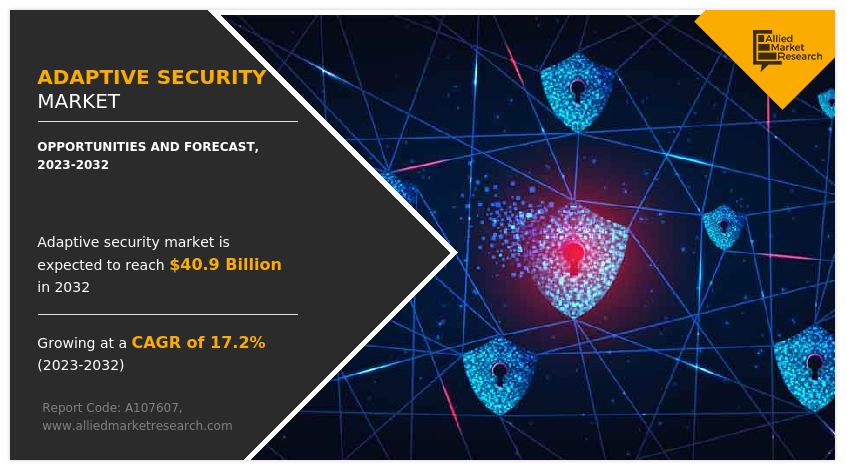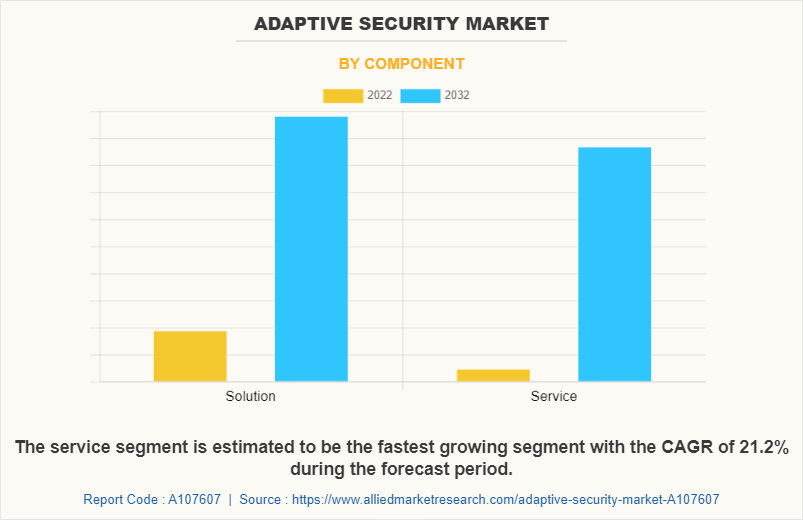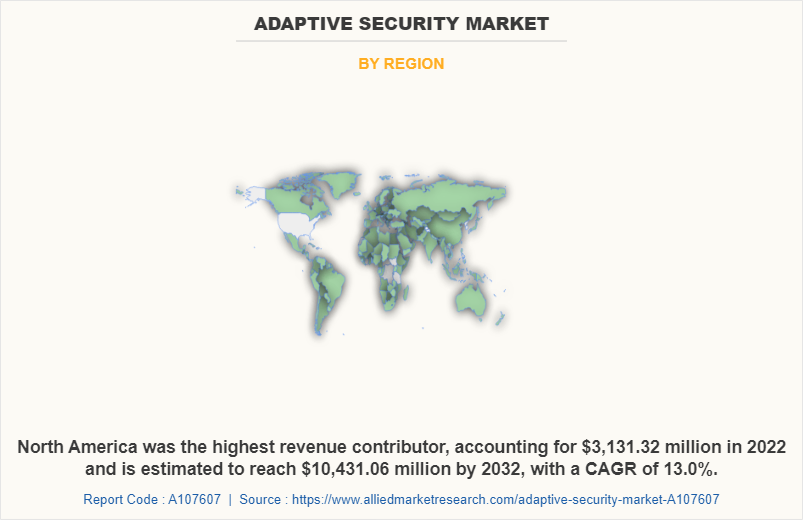Adaptive Security Market Insight, 2032
The global adaptive security market was valued at $8.6 billion in 2022, and is projected to reach $40.9 billion by 2032, growing at a CAGR of 17.2% from 2023 to 2032.
Adaptive security refers to building security systems or protocols that may continuously modify their behavior and defenses based on the current threat environment or changing conditions. It involves the ability to detect and respond to new and emerging threats in real-time, rather than relying on static security measures. Adaptive security systems often incorporate machine learning algorithms, artificial intelligence, and behavioral analysis techniques to continuously monitor and analyze network traffic, user behavior, and system vulnerabilities. By adapting to emerging threats and anomalous activities, these systems can enhance their ability to detect and mitigate attacks, minimize false positives, and provide proactive defense mechanisms. In addition, adaptive security systems may respond to threats in real-time by dynamically adjusting the defenses and countermeasures. This proactive approach allows for quicker detection and mitigation of attacks, reducing the potential impact and minimizing the time window for exploitation.

Furthermore, the integration of advanced technologies such as AI, ML and cloud computing has the potential to create several benefits for businesses and consumers, including detecting and responding to emerging threats more effectively. Such adaptive security market trends are expected to provide the lucrative opportunities for the market growth during the forecast period. In addition, an adaptive security service can help to improve efficiency and productivity for businesses, as well as reduce costs.
Moreover, it can provide enhanced security solutions and a better user experience for end users. In addition, adaptive security strategies provide flexibility and scalability to adapt to evolving threat landscapes and changing business requirements. These aforementioned factors are anticipated to provide lucrative opportunities for market growth during the forecast period.
Factors such as growth in digitalization, rise in need for intelligent software systems, and increase in adoption of advanced technologies positively impact the growth of the market. In addition, rise in adoption of IoT devices, advancements in AI technology, and growth in demand for automation are expected to fuel the growth of the market during the forecast period. Furthermore, expansion of adaptive security applications in various industries such as healthcare, agriculture, and retail, are expected to provide lucrative growth opportunities for the market in the upcoming years.
Moreover, development of edge computing technology to enable real-time processing of data and reduce latency and adoption of cloud computing to enable scalability, flexibility, and cost-effectiveness of adaptive security systems are anticipated to create lucrative opportunities for the market growth. However, data privacy & security concerns and lack of standardization in data formats, communication protocols, & network are expected to hamper the market growth.
Segment Review
The adaptive security market is segmented into component, deployment mode, application, industry vertical, and region. By component, it is bifurcated into solution and service. By deployment mode, it is divided into on-premise and cloud. Based on application, it is categorized into network security, application security, end point security, cloud security and others. By industry vertical, the market is classified into BFSI, IT & telecom, retail and e-commerce, manufacturing, healthcare, energy and utilities, government & defense and others. Region wise, it is analyzed across North America, Europe, Asia-Pacific, and LAMEA.

On the basis of component, the global adaptive security market share was dominated by the solution segment in 2022 and is expected to maintain its dominance in the upcoming years. Owing to advances in technologies enabling adaptive security systems to transform industries globally, from BFSI, to manufacturing, healthcare, and others. However, the service segment is expected to witness the highest growth, as adaptive security services reduce the time and costs associated with optimizing systems in the initial phase of deployment.

By region, North America dominated the market share in 2022 for the adaptive security market. The increasing investment in advanced technologies such as cloud-based services, AI, ML, business analytics solution and IoT to improve businesses and the customer experience are anticipated to propel the growth of the adaptive security market. However, Asia-Pacific is expected to exhibit the highest growth during the forecast period. This is attributed to the increase in penetration of digitalization and higher adoption of advanced technology are expected to provide lucrative growth opportunities for the market in this region.
Key Strategies/Development:
- In April 2023 - Radware partnered with Cisco, and added Cisco Secure Cloud DDoS Protection, powered by Radware, to the Cisco Enterprise Agreement (EA). The addition of cloud DDoS protection to the EA simplifies the purchasing and licensing of Secure Cloud DDoS Protection for Cisco customers.
- In December 2022 - Sophos launched Sophos Managed Detection and Response (MDR) with new threat detection and response capabilities. This product is expected to provide unprecedented visibility and detection across diverse operating environments and help to enhance the customers' experiences.
- In October 2021 - Fujitsu collaborated with Trend Micro, with this collaboration, Fujitsu will provide a security countermeasure solution for connected cars, the V-SOC (Vehicle-Security Operation Center) service, and Trend Micro Cloud One will protect the backend cloud infrastructure.
Top Impacting Factors
The Rise in Demand of Enhanced Security Solution:
The demand for enhanced and updated security solutions in adaptive security is increasing gradually, owing to the growing sophistication and frequency of cyber-attacks. Nowadays, cyber threats have become a key concern for various stakeholders, and therefore, identifying and analyzing potential security threats is an alarming need to an organization's systems, networks, data, and developing safeguards to mitigate the analyzed threats. Hence, the rising number of cyber-attacks and data breaches is becoming a key driving force for increasing the awareness of security solutions, which in turn, aiding the market growth.
Furthermore, organizations are often recognizing the importance of proactive cyber security measures, such as enhanced cyber security and threat modelling solutions, which is driving the market growth. Businesses are increasingly using cyber threat modelling systems to detect possible threats and vulnerabilities, by implementing the necessary security measures, further resulting in reducing the risk of cyber-attacks. Therefore, such factors are significantly contributing to the huge potential for growth and development of the adaptive security market.
Moreover, regulatory compliance requirements and industry standards, such as the General Data Protection Regulation (GDPR), Payment Card Industry Data Security Standard (PCI-DSS), and National Institute of Standards and Technology (NIST), often require organizations to conduct threat modeling as part of the security programs. This has further increased the demand for enhanced security solutions among government entities, which in turn, drives the need for adaptive security market. In addition, the increasing technological investment of public and private businesses is further promoting the usage of threat modeling tools in adaptive security market. For instance, in October 2022, IriusRisk raised $29 million fund that, primarily focused on automating the threat modeling tools for applications. As a result, these investment initiatives for expanding security in digital solutions are anticipated to contribute to the growth of the adaptive security market.
Rise in Adoption of Digitalization in Businesses:
The rising trend of digitalized solutions in security to improve optimization is directly influencing the growth of the global adaptive security market. Digitalized security solutions and services, including adaptive security solutions, offers several benefits, such as scalability, flexibility, and cost-effectiveness, help organizations to manage security operations in a more streamlined and centralized way. Consequently, digitalized security operations are gaining significant adoption to increase the use of IT and control systems among security operators, particularly IoT and other digital technologies. These numerous features associated with the digitalized security solutions are anticipated to contribute to the increased installation of adaptive security industry across the globe.
Furthermore, the integration of digitalized solution allows early detection of threats and fight against cyber threats because it detects and removes malware hidden in seemingly innocuous files, such as PDFs, Microsoft office documents, and image files. Adaptive security solutions are also capable of removing malicious code from these files, preventing attacks such as ransomware, phishing, and other forms of malware, which in turn, accelerating the adaptive security market forecast. In addition, the integration of digital solutions including cloud systems in security operations has reduced the rate of errors, as well as operating costs. Hence, these multiple benefits offered by digitalized solutions and services use in adaptive security will boost the demand for market.
Moreover, several private and public companies are continuously involved in promoting cloud solutions in security operations and maintenance, as digitalization has become a necessary step in managing security operations and maintaining safety. For instance, in February 2023, a cloud security provider, Wiz raised $300 million in funding to expand its cloud security platform, enabling organizations to further combine the cloud security program to a single platform built for cloud. Overall, the promotion of cloud-based solutions in security operations and maintenance is a trend that is expected to continue as more organizations move the data and applications to the cloud. Such investment assembling in the digitalizing of the security system will fuel the demand for digitalized security solutions and services, which in turn, augment the adaptive security market growth on a global scale.
COVID-19 Impact Analysis
The pandemic prompted every company and business to shift their business operations toward a remote work environment. As a result of the dire situation, companies began implementing their own device (BYOD) programs or enterprise-owned equipment. This led to more exposure to cyber-attacks. It further caused a global incline in the demand for security services due to lockdown measures and transport restrictions imposed by national authorities, while enabling security providers to deliver crucial services. These measures directly impacted on the economy of the IT sector, with the partial or complete shutdown of businesses, particularly international services.
On the other hand, with more people working remotely and increased reliance on digital infrastructure, organizations witness heightened cybersecurity risks. This has driven the demand for adaptive security solutions that may quickly respond and adapt to emerging threats. As per the UK’s Action Fraud National Fraud & Cyber Crime Report, in March 2021, over 6,000 cases of pandemic-related fraud and cybercrime had been reported, with victims having lost $45.13 million. This will boost safety and security operations in the organizations. Consequently, these factors are expected to have less negative impact on the growth of the global adaptive security market in the upcoming years.
Furthermore, the market witnessed a significant upturn, owing to the robust demand for security services across the world and escalating use of digital services in several sectors such as healthcare and manufacturing post the COVID-19 pandemic, thus accelerating market growth.
Key Benefits for Stakeholders
- The study provides an in-depth adaptive security market analysis along with the current trends and future estimations to elucidate the imminent investment pockets.
- Information about key drivers, restraints, and opportunities and their impact analysis on the adaptive security market size is provided in the report.
- Porter’s five forces analysis illustrates the potency of buyers and suppliers operating in the adaptive security industry.
- The quantitative analysis of the global adaptive security market for the period 2022–2032 is provided to determine the adaptive security market potential.
Adaptive Security Market Report Highlights
| Aspects | Details |
| Market Size By 2032 | USD 40.9 billion |
| Growth Rate | CAGR of 17.2% |
| Forecast period | 2022 - 2032 |
| Report Pages | 319 |
| By Component |
|
| By Deployment Mode |
|
| By Application |
|
| By Industry Vertical |
|
| By Region |
|
| Key Market Players | Panda Security Inc., Cloudwick Inc., Cisco Systems Inc., Fortinet, Inc., Aruba Networks Inc., Rapid7 Inc., IBM Corporation, Juniper Networks Inc., RSA Security LLC, Trend Micro Incorporated |
Analyst Review
As the adaptive security services industry continues to evolve, CXOs are evaluating the opportunities and challenges regarding this emerging technology. The adaptive security industry has grown rapidly in response to the massive amounts of data generated by Internet of Things (IoT) devices, and the need for AI-powered analytics and decision-making. CXOs are highlighting the benefits that adaptive security platforms can offer, such as mitigate emerging risks by continuously monitoring the threat landscape, enabling real-time insights and security related decision-making. In addition, the adaptive security solutions often provide the flexibility to adjust security controls, policies, and processes based on real-time insights, ensuring that security measures remain effective and aligned with the organization's changing needs. Such factors are expected to provide lucrative opportunities for market growth during the forecast period.
Furthermore, adaptive security allows for targeted resource allocation by focusing on high-risk areas and investing in the most critical security measures. However, CXOs also recognize the challenges associated with adaptive security services. One of the significant challenges is the industry's technical complexity, with multiple technologies offering different solutions and technologies, which can make it challenging for organizations to manage and coordinate these complex systems. In addition, adaptive security relies heavily on collecting and analyzing vast amounts of data from various sources, such as network traffic, user behavior, and threat intelligence, which can be a barrier to the growth of global market.
Furthermore, adaptive security systems need to strike a balance between detecting genuine threats and avoiding false positives or false negatives. Coordinating the system to minimize false alerts without missing real threats can be a challenging task, requiring ongoing fine-tuning and optimization. CXOs must evaluate the platform based on their organization's specific needs and requirements, including factors such as scalability, reliability, and security. By addressing these challenges, CXOs can unlock the full potential of adaptive security services to transform their operations, create value, and gain a competitive advantage in their industry. For instance, in April 2023, Accenture partnered with Google Cloud, to help businesses better protect critical assets and strengthen security against persistent cyber threats. Together, both the companies are providing the technology, trusted infrastructure, and security expertise organizations need to build resilient security programs and maintain confidence in the readiness.
The North America is the largest market for the Adaptive Security.
The Adaptive Security Market is projected to reach at $40,874.06 million by 2032.
Rise in need for intelligent software systems and increase in adoption of advanced technologies positively impact the growth of the market.
The key growth strategies for Adaptive Security include product portfolio expansion, acquisition, partnership, merger, collaboration and others.
Cisco Systems Inc., Cloudwick Inc., Fortinet, Inc., IBM Corporation, Juniper Networks Inc., Panda Security Inc., RSA Security LLC and Trend Micro Incorporated are some of top companies.
Loading Table Of Content...
Loading Research Methodology...



